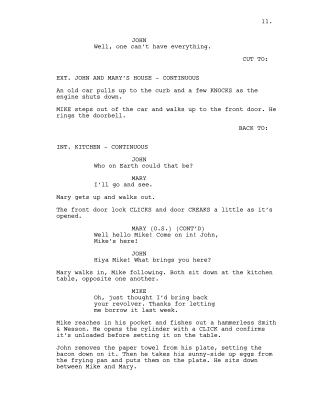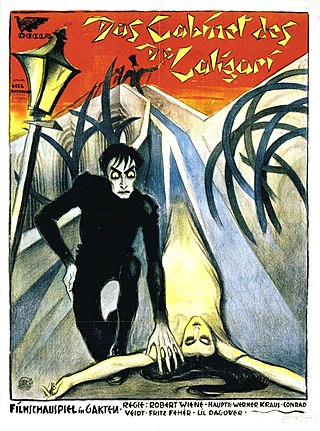Related Research Articles

Akira Kurosawa was a Japanese filmmaker and painter who directed thirty films in a career spanning over five decades. He is widely regarded as one of the most important and influential filmmakers in the history of cinema. Kurosawa displayed a bold, dynamic style, strongly influenced by Western cinema yet distinct from it; he was involved with all aspects of film production.
A comedy film is a category of film which emphasizes humor. These films are designed to make the audience laugh through amusement. Films in this style traditionally have a happy ending. Comedy is one of the oldest genres in film and it is derived from the classical comedy in theatre. Some of the earliest silent films were comedies, as slapstick comedy often relies on visual depictions without requiring sound. When sound films became more prevalent during the 1930s, comedy films took another swing, as laughter could result from burlesque situations but also dialogue.
In fiction, continuity is a consistency of the characteristics of people, plot, objects, and places seen by the reader or viewer over some period of time. It is relevant to several media.

A documentary film or documentary is a non-fictional motion-picture intended to "document reality, primarily for the purposes of instruction, education or maintaining a historical record". Bill Nichols has characterized the documentary in terms of "a filmmaking practice, a cinematic tradition, and mode of audience reception [that remains] a practice without clear boundaries".

The Carry On series of 31 British comedy films were released between 1958 and 1992, produced by Peter Rogers with director Gerald Thomas. The humour of Carry On was in the British comic tradition of music hall and bawdy seaside postcards. In between the films, Rogers and Thomas produced four Christmas television specials (1969–1973), a 1975 television series of thirteen episodes, and three West End stage shows that later toured the regions. The series drew on regular ensemble that included Sid James, Kenneth Williams, Charles Hawtrey, Joan Sims, Kenneth Connor, Peter Butterworth, Hattie Jacques, Terry Scott, Bernard Bresslaw, Barbara Windsor, Jack Douglas, and Jim Dale. A 31st film was released in 1992, though featuring only four of the "irregular" cast members.

A screenplay writer is a writer who practices the craft of screenwriting, writing screenplays on which mass media, such as films, television programs and video games, are based.
A screenplay, or script, is a written work by screenwriters for a film, television show, or video game. A screenplay written for television is also known as a teleplay. Screenplays can be original works or adaptations from existing pieces of writing. A screenplay is a form of narration in which the movements, actions, expressions and dialogue of the characters are described in a certain format. Visual or cinematographic cues may be given, as well as scene descriptions and scene changes.

Yasujirō Ozu was a Japanese film director and screenwriter. He began his career during the era of silent films, and his last films were made in colour in the early 1960s. Ozu first made a number of short comedies, before turning to more serious themes in the 1930s. The most prominent themes of Ozu's work are family and marriage, and especially the relationships between generations. His most widely beloved films include Late Spring (1949), Tokyo Story (1953), and An Autumn Afternoon (1962).

The Cabinet of Dr. Caligari is a 1920 German silent horror film, directed by Robert Wiene and written by Hans Janowitz and Carl Mayer. Considered the quintessential work of German Expressionist cinema, it tells the story of an insane hypnotist who uses a somnambulist to commit murders. The film features a dark and twisted visual style, with sharp-pointed forms, oblique and curving lines, structures and landscapes that lean and twist in unusual angles, and shadows and streaks of light painted directly onto the sets.
A film producer is a person who oversees film production. Either employed by a production company or working independently, producers plan and coordinate various aspects of film production, such as selecting the script, coordinating writing, directing, editing, and arranging financing.
Development hell, also known as development purgatory or development limbo, is media and software industry jargon for a project, concept, or idea that remains in a stage of early development for a long time, because the project is stuck in legal, technical, or artistic challenges. A work may move between many sets of artistic leadership, crews, scripts, game engines, or studios. Many projects which end up in development hell never progress into production, and are gradually abandoned by the involved parties.

A sports film is a film genre in which any particular sport plays a prominent role in the film's plot or acts as its central theme. It is a production in which a sport, sporting event, athlete, or follower of sport are prominently featured, and which depend on sport to a significant degree for their plot motivation or resolution. Despite this, sport is ultimately rarely the central concern of such films and sport performs primarily an allegorical role. Furthermore, sports fans are not necessarily the target demographic in such movies, but sports fans tend to maintain high following and esteem for such movies.

The read-through, table-read, or table work is a stage of film, television, radio, and theatre production when an organized reading around a table of the screenplay or script by the actors with speaking parts is conducted.

Screenwriting or scriptwriting is the art and craft of writing scripts for mass media such as feature films, television productions or video games. It is often a freelance profession.
A scene is a dramatic part of a story, at a specific time and place, between specific characters. The term is used in both filmmaking and theatre, with some distinctions between the two.

Salim–Javed were an Indian screenwriting duo, composed of Salim Khan and Javed Akhtar, working in Bollywood. They are noted for being the first Indian screenwriters to achieve star status, becoming the most successful Indian screenwriters of all time. They are regarded as "Hindi cinema's greatest screenwriters". They worked together on 24 films during 1971–1987, of which twenty were commercially and critically successful films. They worked together on 22 Bollywood films, as well as two Kannada films.
Script coverage is a filmmaking term for the analysis and grading of screenplays, often within the "script development" department of a production company. While coverage may remain entirely oral, it usually takes the form of a written report, guided by a rubric that varies from company to company. Criteria include, but are not limited to:
A spec script, also known as a speculative screenplay, is a non-commissioned and unsolicited screenplay. It is usually written by a screenwriter who hopes to have the script optioned and eventually purchased by a producer, production company, or studio.
Vernon Zimmerman is an American writer and director who made his debut as director with the 1962 short Lemon Hearts starring Taylor Mead. He collaborated with Terrence Malick on the script to his directorial debut, the road movie, Deadhead Miles. Zimmerman wrote and directed the Claudia Jennings roller derby drive-in film Unholy Rollers. He is most well known for his horror slasher film Fade to Black, a dark and despairing psychological study of an awkward and alienated hardcore film buff who exacts a harsh revenge on his cruel tormentors. Zimmerman received a Saturn Award nomination as Best Director for the film, a predecessor to more well-known modern parodies of the horror genre. Vernon also wrote the scripts for the horror-Western Hex, the redneck crime exploitation film Bobbie Jo and the Outlaw, the made-for-TV wrestling comedy/drama Mad Bull, the failed TV pilot film Shooting Stars, and the teen fantasy comedy Teen Witch. Zimmerman's latest film is the six-minute comic short Chuck and Wally on the Road. More recently Vernon has been working as a script analyst. He also teaches screen-writing courses at UCLA's Extension and Certificate Program. Zimmerman also taught classes on both writing feature scripts and directing actors for film and television at the USC School of Cinema and Television. Vernon Zimmerman lives in Los Angeles and is a member of both the Writers Guild of America and the Directors Guild of America.
Video game writing is the art and craft of writing scripts and narratives for video games. Similar to screenwriting, it is typically a freelance profession. It includes many differences from writing for film, due to the non-linear and interactive nature of most video games, and the necessity to work closely with video game designers and voice actors. There are many differing types of text in video games in comparison to stage shows or movies, including written text, foreign or made-up languages, and often situation-based information. Especially when developing Triple A games, more than one writer will be required to create the game, split into different roles.
References
- ↑ Garfinkel, Asher (2007). Screenplay Story Analysis. Allworth Press. ISBN 978-1-58115-478-8.
- ↑ Laura Schellhardt (2011). Screenwriting For Dummies. John Wiley & Sons. ISBN 978-1118052624 . Retrieved 31 December 2014.